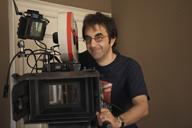24th Sept - 1st Oct 2009


Architect of Imagery: Douglas Sirk Award for Atom Egoyan
Hamburg, den 27.09.2008

There is always this one unforgettable image in every film by Atom Egoyan. In “The Adjuster” (1991) it is the image of an archer who stands at the window, shooting at billboards. In the middle of a housing estate. The 48-year-old Canadian director Atom Egoyan is known for his architecture of peculiar, abstract imagery, reminiscent of David Lynch. As a director he is very much ruled by his head, and he displays mental brilliance in the delicate net he weaves between different levels of time, figures and relationships. It is seldom easy to understand and, indeed, it has no intention of being so: Atom Egoyan’s nine cinema films are riddles that often become comprehensible only upon repeated viewings. But each of these films features that one image. What was an archer in “The Adjuster” is a yellow school bus in “The Sweet Hereafter” (1997), driving towards the demise of its passengers. And in his latest film, “Adoration”, it is the image of a veiled Arabian woman who appears in front of the Christmas decorations of a Canadian suburban house.
Egoyan’s own biography invokes images of vivid clarity. He is born in 1960 in Cairo to Armenian parents, who give him his first name in correspondence to the first Egyptian nuclear power station to be connected to the power grid. Another image could be that of the student Egoyan, whose family had emigrated to Canada in 1964, who enrols for politics and classical guitar and who discovers his vocation to make films following a first short film. Another image: at the Montreal festival in 1987, Wim Wenders is so impressed by Egoyan’s third film “Family Viewing”, that he dedicates the award he receives for “Wings of Desire” to his young Canadian colleague. Egoyan, whose wife Arsinďż˝e Khanjian stars in all of his films, often stages contrasting stories that elude schematization. In “Ararat” (2004) he turns his attention to the genocide of c one million Armenians in 1915/1916, before he next dissects the cynical world-view of an entertainment duo of the fifties in “Where the Truth Lies” (2005). His themes, developed with unobtrusive political conscience, encompass loss, alienation, solitude, grief and - repeatedly - consolation. Among all the doubts and questions that arise, there is always this one figure to hold on to, like the innocent bus driver in “The Sweet Hereafter”. “Adoration” sees the foregrounding of the alienation of man in a world shaped by digitalization and post 9/11 traumata.
The fact that his protagonists tend to appear a few degrees cooler than is customary in the cinema, bestows all of Egoyan’s films with that oh-so-necessary distance that makes the incomprehensible bearable. For instance the thought of a man smuggling a bomb in his pregnant wife’s hand luggage, as depicted in “Adoration”. While his films may be considered complicated, Egoyan himself approaches his topics with human straightforwardness. He once said: “It is easier to discuss the more theoretical aspects of my work, as questions on the emotional level become almost embarrassingly simple… Why do we need the others? What must we do to receive love? What can we earnestly give of ourselves if we don’t know who we really are?” Which brings us to the last image. The image of the director, who looks at the world and the people in it in the same way as artists have been looking at the world all through the ages: sceptically, curiously, critically, apprehensively and - full of hope. Silke Schďż˝tze
THE DOUGLAS-SIRK-AWARD is presented on 27th September at 7.45pm in the CinemaxX on occasion of the screening of “Adoration”.
The „Metropolis Kino im Savoy“ gives an insight in Egoyan’s work with a focus on his earlier films and selected highlights from the past years. From October 1st on you will see five films from 1984 bis 1994, shown in Original Version with German subtitles. One of them will be the Oscar nominated „The Sweet Hereafter“ (Das s��e Jenseits“) and the film that impressed Wim Wenders so much, „Familie Viewing“.
